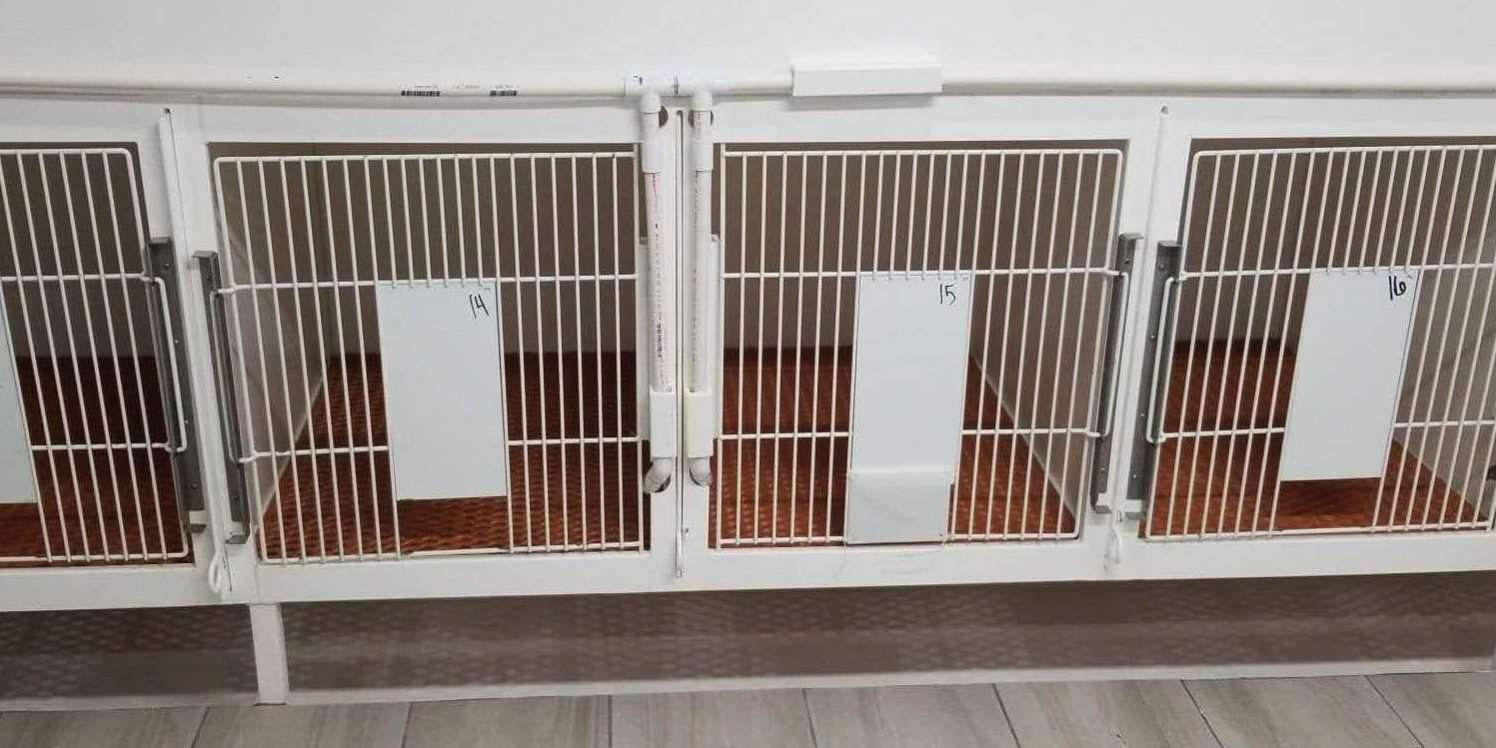Paws and Floors: Choosing the Best Kennel Flooring for Your Clinic
In the world of animal clinics, every detail matters, down to the floors that see thousands of paws each year. Dog kennel flooring for animal clinics isn’t just about aesthetics; it’s about providing a clean, warm, and dry area that can significantly impact the well-being of the dogs and the efficiency of the facility. The right flooring can enhance safety, hygiene, and comfort, making it an indispensable aspect of any clinic’s design.
Types of Kennel Flooring
When it comes to kennel flooring, choosing the right type is crucial for the well-being of animals and the functionality of the clinic. Let’s explore the leading options available, starting with the innovative solution offered by RACS:
Plastisol Coated Animal Flooring: RACS Animal Care Systems offers a superior flooring solution crafted from top-grade steel, fully coated with plastisol (polyvinyl, plastic). This unique combination ensures durability, comfort, and hygiene. The plastisol coating not only protects against corrosion but also provides a softer surface for animal paws, making it an ideal choice for both indoor and outdoor kennels. Additionally, its design allows for easy cleaning and maintenance, promoting a healthier environment for animals.
Rubber Flooring: Rubber is known for its shock-absorbing qualities and non-slip surface, beneficial for active animals. It’s also gentle on paws and can significantly reduce noise levels. However, it’s important to select high-quality rubber that won’t harbor odors and is easy to clean. While rubber flooring has its advantages, it might not offer the same level of durability and hygiene as RACS’ Plastisol Coated Animal Flooring.
Epoxy Flooring: Epoxy floors are durable and seamless, resistant to stains, spills, and scratches, and they are relatively easy to sanitize. However, the hardness of epoxy might not be as comfortable for animals without additional softer materials. This is where RACS flooring stands out, offering both comfort and durability in one solution.
Concrete: Often used in outdoor settings, concrete is a durable and cost-effective option. Its major drawbacks are its cold, hard, and porous nature, unless sealed properly. In contrast, RACS Plastisol Coated Animal Flooring provides a more comfortable and hygienic alternative that doesn’t compromise on durability or require frequent maintenance.
Interlocking Tiles: These tiles offer ease of installation and the flexibility of design customization. They’re relatively easy to replace if damaged. However, they might not provide the all-in-one benefits of RACS flooring, which is designed to meet the specific needs of animal clinics and kennels.
Why Choose RACS Flooring: RACS’ Plastisol Coated Animal Flooring stands out as a premium choice in kennel and animal clinic environments. It’s designed to offer the best in durability, ease of cleaning, comfort, and aesthetic appeal. With RACS flooring, clinics can enjoy a harmonious balance of practicality and animal welfare, creating a safe and inviting space for both animals and staff.
In summary, while various flooring options exist, RACS Plastisol Coated Animal Flooring emerges as the leading choice for those seeking a high-quality, durable, and animal-friendly solution.
Key Considerations for Optimal Flooring
Choosing the best flooring for veterinary kennels goes beyond initial costs. Here are some critical factors to keep in mind:
Durability: Considering the traffic in animal clinics, you need a floor that withstands scratches, wear, and accidents without deteriorating quickly.
Non-slip: Safety is paramount, and flooring that prevents slips and falls is a necessity, especially in areas that get wet.
Ease of Cleaning: Hygienic flooring for animal facilities is non-negotiable. The material should be easy to clean, disinfect, and should not retain odors or moisture.
Comfort: How comfortable is the flooring for the animals? It should offer sufficient cushioning and warmth, especially for clinics that house pets for extended periods.
Installation and Strength: The flooring should have a hassle-free installation process and a high strength-to-weight ratio. Products like RACS Industrial kennel floors are designed to accommodate the weight of multiple individuals and animals, ensuring safety and durability.
Benefits of Quality Kennel Flooring
High-quality kennel flooring is an investment that pays off in various ways:
Improved Hygiene: Floors that are easy to clean contribute to the overall sanitation of the clinic, reducing the risk of cross-contamination and the spread of diseases.
Enhanced Safety: Non-slip flooring mitigates the risk of falls, providing a safer environment for both pets and staff.
Durability: Quality flooring solutions, fully coated to prevent rust and erosion, are built to last, reducing the need for frequent replacements.
Comfort: Quality floors enhance the comfort of pets housed in the facility, reducing stress and promoting overall well-being.
Installation and Maintenance
Proper installation is key to maximizing the efficacy and durability of your flooring. Many high-quality options are designed to fit the specific dimensions of your space and are ready to use once set in place. They are also autoclave safe, making the cleaning process more efficient and effective.
Cost Analysis
The costs of pet hospital flooring vary widely depending on the material, installation, and maintenance requirements. While some options might have higher upfront costs, their durability and ease of maintenance could result in lower long-term expenses. It’s essential to conduct a thorough cost-benefit analysis before making a decision.
Case Studies and Expert Tips
Real-world examples and insights from other animal clinics can be invaluable. Seek out case studies that showcase how certain flooring solutions improved other facilities. Additionally, consulting with industry experts or colleagues can provide practical tips tailored to your clinic’s specific needs and challenges.
Navigating Through Options: Expert Insights
While this guide provides a comprehensive overview, the unique circumstances of your clinic will ultimately dictate the best solution. Reach out to professionals, request samples, and don’t hesitate to ask questions. The health and comfort of the animals in your care are worth the effort!
Common Questions About Kennel Flooring
1. What is the best flooring for dog kennels?
There’s no one-size-fits-all answer as it depends on various factors like your budget, the climate, the type of dogs you care for, etc. Evaluate your needs against the options available to make an informed decision.
2. How do I choose flooring for an animal clinic?
Consider factors such as durability, comfort, ease of cleaning, and installation. It’s also wise to consult industry experts and read case studies.
3. How does flooring impact the comfort and safety of dogs in kennels and crates?
The right flooring in kennels and crates is crucial for both comfort and safety. It should be gentle on paws and joints, reduce the risk of slips and falls, and provide adequate insulation against cold or hard surfaces.
4. What should I consider when selecting flooring for outdoor dog kennels?
For outdoor dog kennels, consider weather-resistant materials that can withstand various climate conditions. The flooring should be easy to clean, durable against wear, and provide comfort for the dogs in different weather scenarios.
5. How can I maintain hygiene in a pet shelter through flooring?
Choose non-porous materials that are easy to clean and disinfect, and ensure regular maintenance following the manufacturer’s guidelines.
Remember, the best kennel flooring solution will cater to the needs of both the pets and your facility, ensuring safety, hygiene, and comfort, all while being cost-effective. Choose wisely!








